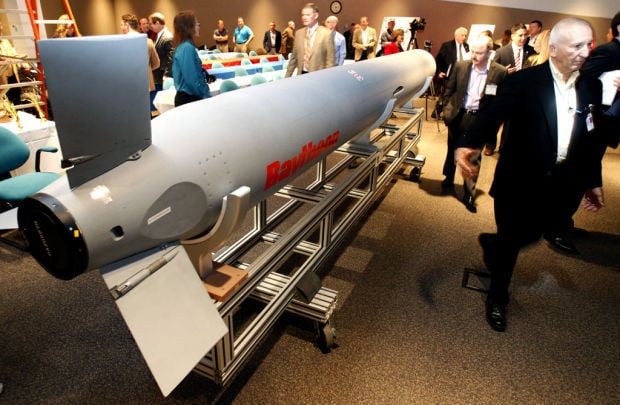A federal lawsuit filed against Tucson-based Raytheon Missile Systems by a former development partner on a new warhead for the Tomahawk cruise missile is moving forward on just one claim, after a judge tossed most of the plaintiff’s claims as filed too late.
Ordnance Technologies North America Inc. sued Raytheon in federal court in May 2012, alleging the missile maker stole trade secrets involving a proposed new, bunker-busting warhead for the Tomahawk.
Ordnance alleges that Raytheon stole trade secrets for use on a Navy project to develop the new Tomahawk warhead, known as the Joint Multi-Effects Warhead System.
Ordnance, based in Orlando, Florida, sought a court order halting Raytheon’s use of the technology, as well as unspecified damages, saying rights to the technology are worth at least $12 million.
Raytheon has denied any wrongdoing, arguing that though the companies shared information, no proprietary information from Ordnance was adapted to the latest version of the Tomahawk and that Ordnance’s lawsuit was barred because it was filed after applicable statutes of limitations.
In January, U.S. District Judge Cindy K. Jorgenson ruled in favor of Raytheon’s motion for summary judgment on nine of 10 of Ordnance’s most serious claims — including misappropriation of trade secrets, unjust enrichment and unfair competition — finding that they were filed past the applicable statutes of limitations.
Raytheon has filed a motion for summary judgement on Ordnance’s remaining claim, for breach of contract, contending that claim also was made too late and that the contract Ordnance alleges was breached was a “technical assistance agreement” required under international arms-control laws and not a commercial contract.
Approval of Raytheon’s motion for summary judgment could avert a jury trial in the case.
Both sides were scheduled to take depositions from witnesses starting last week, with final supporting documents due by the end of September. No hearings have been set.
Meanwhile, the new warhead could be included in a planned program to upgrade and recertify most of the estimated 3,000 to 4,000 Tomahawks in the Navy’s inventory.
MISSILE-MOTOR SUIT MOVES AHEAD
A breach-of-contract lawsuit Raytheon filed against a rocket-motor supplier is moving ahead in state court after Raytheon successfully fought a bid to move the case to federal court.
In July 2013, Raytheon filed a $100 million lawsuit in Pima County Superior Court against Alliant Techsystems Inc., accusing the Virginia-based company of failing to supply rocket motors for the Advanced Medium-Range Air-to-Air Missile that met military requirements.
The rocket-motor failures became a big issue when they prompted the Air Force to halt deliveries and suspend $419 million in payments to Raytheon in February 2012.
Deliveries of AMRAAMs — a mainstay air-combat missile for the U.S. and its allies — and payments to Raytheon were resumed after new motors from a Norwegian company were qualified for use.
The day after Raytheon filed suit, Alliant — commonly known as ATK — filed a federal lawsuit in Virginia, seeking judgments that Raytheon improperly terminated its motor-purchase orders and asking $30 million in damages. ATK argued that the matter was properly in federal court because it involves federal defense subcontracts and matters of national security.
In January, Jorgenson remanded the case to state court, citing a similar decision by a federal judge in Virginia in January 2013.
Both companies have declined comment on the suits, and some documents have been sealed.
ATK maintains that it met its contractual terms and that the motors failed cold-temperature testing because specifications for the rocket motors were defective.
If the lawsuit isn’t settled, a trial could drag on for years.
The court has allowed more than a year for evidence discovery and filed testimony in the suit, which has been declared a “complex case” requiring continuous judicial management.
Pima Superior Court Judge Stephen C. Villarreal has tentatively scheduled a pretrial hearing in November 2015 and a 20-day jury trial starting Jan. 12, 2016.





